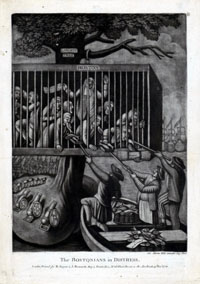The Coercive Acts

As a direct response to the Boston Tea Party, Lord North's ministry during the early months of 1774 brought before Parliament the Coercive Acts, a string of bills that became known in the colonies as the Intolerable Acts: The Boston Port Act (March 31, 1774), the Massachusetts Government Act (May 20, 1774), the Administration of Justice Act (May 20, 1774), and the Quartering Act (June 2, 1774). The Quebec Act (June 22, 1774), mostly because of timing rather than intent, was also considered by some colonials, especially in New England, and by many historians as part of the Intolerable Acts. The most important of them was the first passed, the Boston Port Act, because it was news of its passage that led to the call for the First Continental Congress. Within a year, the British government's attempt to enforce the bundle of legislation tipped a constitutional crisis into the Revolutionary War.
The Coercive Acts closed the port of Boston, unilaterally changed the government of the Massachusetts Bay Colony to centralize British authority, permitted colonial leaders accused of crimes to be tried in another colony or in England, and sanctioned the billeting of British troops in unused buildings.
North's ministry considered the acts as critical to the restoration of Parliament's authority in the colonies. British Americans perceived them as arbitrary and unreasonable attacks on fundamental constitutional rights. Among the Intolerable Acts, some colonials included the Quebec Act, because it protected the Roman Catholic Church in Canada, established a royally-appointed rather than an elected legislative assembly, and placed much of the western territory that colonials hoped to exploit outside of the reach of American governments.
Although the clear target of the Intolerable Acts was Boston, the greater audience for the legislation included every radical and potential opposition leader in the British Atlantic. The striking revocation of the province's 1691 charter by the Massachusetts Government Act, for example, was an intentional display of the supremacy of Parliament, a serious lesson to be learned by all of the colonies, from Ireland to Barbados. If the legislation succeeded in separating Boston from the rest of the colonies and bringing its residents to heel, no disaffected upstarts could legitimately claim that sovereignty over any constitutional matters derived from any source outside of Parliament.
Word of the Intolerable Acts led to an unprecedented outbreak of public dismay and disaffection throughout British America (including the Caribbean) and directly resulted in the creation of the First Continental Congress in September 1774 compromised of delegates from 13 of the mainland colonies.




